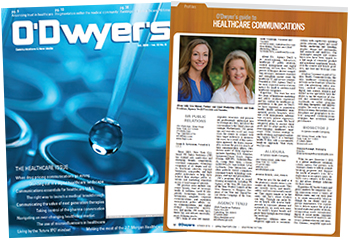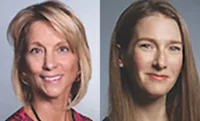 Dan Burgess Dan Burgess |
Communicators in pharmaceuticals and healthcare only recently got a handle on Millennials, and already we find ourselves sprinting to understand Generation Z. As well we should. Comprising one-quarter of the US population today, these Americans born after 1995 are expected to represent 40 percent of all consumers in 2020. Fortunately, we already know what Gen Z wants from digital communications, because we were the ones who shaped their expectations of digital in the first place.
 |
| This article is featured in O'Dwyer's Oct. '19 Healthcare & Medical PR Magazine. |
Much is made of the unique socioeconomic characteristics of Gen Z. It’s the most racially and ethnically diverse generation in history, has the highest rates of high school graduation and college attendance, and is least likely to live in rural America. What’s truly differentiating and of paramount importance for communicators is Gen Z’s relationship to technology. Gen Z is the first generation to have been born into an environment constantly conditioning them with smartphone alerts and behavioral modification algorithms, a virtual Skinner box.
Paradoxically—and thankfully—this always-on experience seems to have left Gen Zers unimpressed with glitzy veneers and unmoved by tactics that motivated previous generations. Gen Zers are after truth and authenticity, and it remains to be seen whether their alarmingly high rates of depression and anxiety are the result of constant connection or the frustrating realization that genuineness too often can be in short supply. To beat a dead horse, for Gen Zers, content truly is king, and they’re set on separating the real stuff from the fluff.
What is good digital to Gen Z?
Pharma and health communicators have learned to adapt to meet the needs and expectations of our audiences as media technologies have evolved to deliver our messages. We’ve followed the advances in communications for each generation: television for the Baby Boomers, computers for Generation X, the Internet for Millennials. In contrast, Gen Zers were born into a relatively mature space for all these technologies and were given it all in a handheld device before they were out of elementary school. Little wonder that they have an average attention span of eight seconds; they must continually evaluate and decide whether the newest piece of digital information coming at them is worth their time or can be dismissed.
Good digital communications to Gen Z is what it’s learned from Google and Apple and Amazon and Netflix: namely, digital experiences that are timely, trustworthy, transparent and tolerant. What Gen Z values in digital is the result of the best efforts of user experience designers and digital customer experience architects over the last 40 years, and especially over the last decade, with the coming of the iPhone. Whereas previous generations respond more positively to user-centered design, Gen Z expects it.
Timely. Digital customer experiences must deliver valuable information on demand. There should be no unreasonable delays or other unnecessary “seams” that disrupt the flow of content or bungle the transitions between discovering, learning, assessing and doing. Gen Zers expect to move between mobile and the real world without missing a beat or losing their personal information or previously expressed preferences. Access to health information should be intuitive and uncomplicated, whether via a search engine or inside a branded and owned experience. Booking an appointment should be efficient and reliable, and health interventions should be accompanied by reasonable reminders and useful tips that fit naturally into the patient’s everyday life.
Trustworthy. The “no filter” generation understands how content can be manipulated and pursues authenticity. Although Gen Zers may lack the cynicism of their Gen X parents, they see merit in questioning what seems stable. Gen Zers witnessed their parents lose 40 percent of their net worth during the Great Recession of December 2007 to June 2009, and they want both the real price of goods and services and an honest value comparison to help them in their purchasing decisions. They value credibility, not celebrity, in testimonials and in their social media influencers, and to be taken seriously, those informed advocates both should look like society at large.
Transparent. Gen Zers are suspicious of the underlying motivations of communications professionals and expect to be able to engage openly and easily in two-way conversations with company service representatives via social media, chatbots, live chat or voice. Gen Zers do accept the role of campaigns and brand messaging in catching their attention, but they expect communications to reflect what brands offer and that the expressed values of companies are manifest in substantive action, not greenwashing. For pharma and healthcare, what appeals to Gen Z is an emphasis on condition-related content, a focus on legitimate patient stories and the amplification of corporate social responsibility efforts that genuinely fit the business.
Tolerant. Generation Z embraces its diversity and respects the range of opinions and identities in the human experience. Gen Zers expect to be part of that pluralistic conversation and are native creators of content that expresses their opinions. They want to engage with you on digital channels, including social, and to amplify your content without being forced to adhere to guidelines that serve only the brand. They understand that digital can deliver personalized experiences and expect digital healthcare communications that anticipate their needs and interests without being too intrusive or creepy. They see that one-size-fits-all too often is interesting to none.
We believe that being Fluent in Human is central to engaging with Gen Z and the continually increasing digital audience. Digital communicators can design user-centric programs that reflect the preferences of the intended audiences, but only by understanding what motivates them and what leads them to tune out can we build the compelling stories and personal connections they want. Only through human-centric engagement strategies can we together create meaningful change.
***
Dan Burgess is Director of Digital Engagement at Health Unlimited, which will join M Booth as M Booth Health.


 Lo Isidro, senior director at Real Chemistry with more than a decade of strategic communications and PA experience, has joined Narrative Strategies.
Lo Isidro, senior director at Real Chemistry with more than a decade of strategic communications and PA experience, has joined Narrative Strategies. Nelson Fernandez, former North American chair of APCO Worldwide and managing director of Burson-Marsteller, has joined Volunteers in Medicine Berkshires as director of communications and PA.
Nelson Fernandez, former North American chair of APCO Worldwide and managing director of Burson-Marsteller, has joined Volunteers in Medicine Berkshires as director of communications and PA. Lilit Bargar, who was most recently an EVP in the healthcare practice at Weber Shandwick, comes on board at GCI Health as EVP, corporate practice lead.
Lilit Bargar, who was most recently an EVP in the healthcare practice at Weber Shandwick, comes on board at GCI Health as EVP, corporate practice lead.
 Five ways that successful thought leaders are made.
Five ways that successful thought leaders are made.


 Have a comment? Send it to
Have a comment? Send it to 
No comments have been submitted for this story yet.